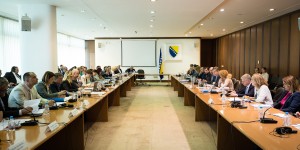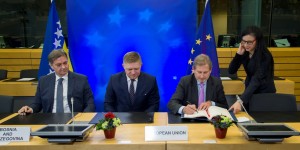Brussels, 15 December 2016
The Stabilisation and Association Agreement (SAA) with Bosnia and Herzegovina was signed in 2008 and entered fully into force in June 2015. Thanks to the SAA and its trade component, the Interim Agreement in force since 2008, 85% of Bosnia and Herzegovina’s exports go to the EU.
Trade preferences between BiH and the EU are already largely asymmetric in favour of BiH: while BiH maintains quotas on the import of multiple EU products, the EU has liberalised almost all of its imports from BiH, with the exception of sugar, wine, baby beef and fish.
The European Commission has negotiated since late 2012 adaptation Protocols with a large number of countries, including Western Balkans’ countries, in order to avoid the disruption of the existing bilateral trade between these countries and Croatia following the accession of Croatia to the EU in July 2013. Bosnia and Herzegovina is the last Western Balkan country to sign its SAA adaptation Protocol.
What is trade adaptation?
Trade adaptation is a standard procedure that follows any EU enlargement. Its aim is to ensure that trade flows already existing are not disrupted when a new Member State accedes to the EU. In line with the EU traditional trade methodology, the average trade figures for the last three years before the accession of a new Member State are taken as basis to increase existing quotas or establish new quotas in case trade with the new Member State covered other products. Both parties allow for the same quantities of customs-free imports and exports as those that were in place with Croatia before it joined the EU, preserving the status quo ante. The agreement is thus based on the mutual interest of the two sides.
While based on the principle of traditional trade, the Protocol also takes into account the core sensitivities on the side of Bosnia and Herzegovina: first, a phasing-in of quotas has been agreed with regard to particular products; second, tariff quotas below 20 tons have not been opened, with a view to the need for BiH to limit the administrative and financial burden of managing new tariff quotas.
From the date of its provisional application, the EU will also automatically reinstate trade benefits on the import into the EU of certain agricultural products from BiH, including fruits and vegetables (“Autonomous Trade Measures”). These benefits had been suspended for BiH since 1 January 2016 due to the lack of adaptation of the SAA.
With the signature by its Chair the EU-BiH Stabilisation and Association Council also adopted a decision amending Protocol II to the SAA. This replaces with immediate effect the EU-BiH bilateral rules of origin with those contained in the Regional Convention on pan-Euro-Mediterranean (PEM) preferential rules of origin, thus simplifying trade with the EU and opening up new trade opportunities in the wider PEM region. By complying with the rules of origin contained in the PEM Convention, exporters from Bosnia and Herzegovina will gain wider access to the market of the EU as well as the market of all common partners (notably Switzerland, Norway and all the participants in the European Union’s Stabilisation and Association Process).
EU integration path
The full implementation of the SAA, including its adaptation, is an important element of the country’s commitment to the EU integration process. Together with the establishment of a functioning coordination mechanism on EU matters, the adaptation of the SAA was an outstanding issue for the country to address as a matter of priority on its EU integration path.
The resolution of these issues allowed Bosnia and Herzegovina to move forward on its EU path, as illustrated by the request of the EU Council on 20 September 2016 to the Commission for its Opinion on the membership application submitted by Bosnia and Herzegovina on 15 February 2016. On 9 December, Commissioner Hahn visited the country to hand over a comprehensive Questionnaire, which the Commission will use together with other tools to shape its Opinion.



